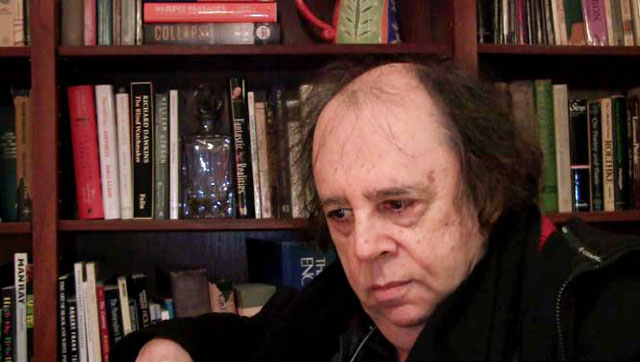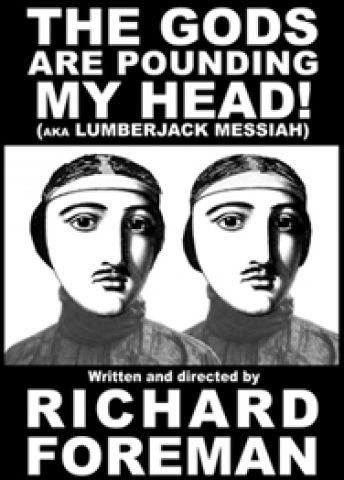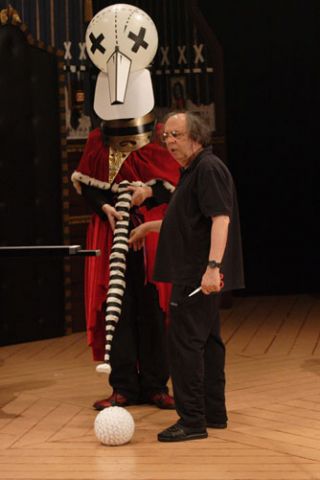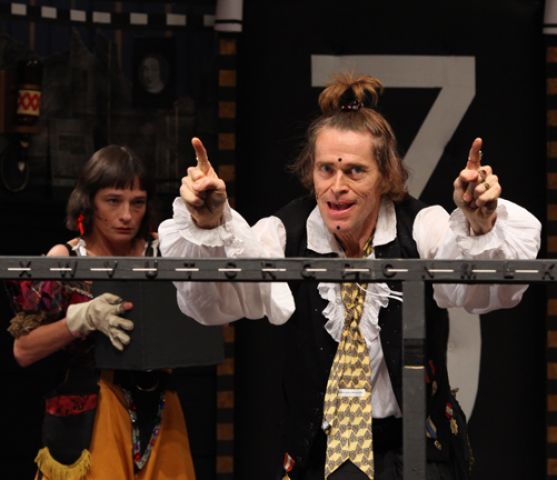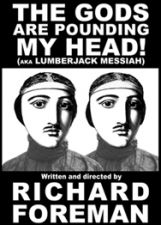EDGE: So you're having a crisis.
FOREMAN: A crisis that I purposely brought upon myself, because I've been making a peculiar kind of theatre for what? 42 years, officially. And it's worn out for me. And for various reasons, I started being interested in film. Of course, a very different kind of film than what other people are making, including the underground filmmakers who both, John, you and I grew up with, many years ago. It means a total re framing or rediscovering of my aesthetic, and I am purposely cutting myself off from many of the techniques that I've been able to exploit for so many years, and this is scary, because I have no assurance that what I do will interest anybody, will be of any value, and yet I'm absolutely aware of some inner necessity that says this is what I have to do, no matter what happens with this activity.
EDGE: Maybe the crisis is that you've been Richard Foreman for too many years.
FOREMAN: Yes, though I'm afraid I am still Richard Foreman. Even though I grew up with many filmmaker friends, I always thought that my particular talent was not for film; it was for theatre. And within the last ten years, I started, for various reasons, putting some films in my play. And as I was rehearsing these plays, with continual filmic backgrounds, I started thinking, I just want to watch what's going on, on the screen; I don't want to be distracted by these actors.
But I do notice, and I was aware, that the difference is that theatre, for me — creating theatre, both writing it, directing it, designing it — was being an active person. A general in an army, who was moving these troops around. And for more than ten years, I've started being bored with having to give everybody orders and moving them around.
Film, for me, is not doing, is not being active. It's just watching what happens, not trying to control it. Now, it's true, the way I film, I very quickly set up a tableau, and within that tableau I give people a few lines, and then we film very fast. And I don't correct it. I accept mistakes. I'm telling people, as we're filming, what to do, which I may then cut out of the soundtrack, in the end. But I get raw material that's almost like filming a riot. And then the task that I have, and the aesthetic task, and the spiritual task, as I see it, is just studying this, in a certain way, bad material that is not carefully wrought, like my theatre is wrought; looking at it again and again and again, to try and discover, uncover, and present the necessity, the spiritual ground that underlies what is not well articulated, just as powerfully as it underlies something that is very sculpted; very well articulated. So it's a whole different process, and it's taking a whole different kind of risk for me. And that's what excites me now.
EDGE: Sitting alone, looking at film?
FOREMAN: Sitting alone, reprocessing it. Because I do it in video. And it seems to me that video is not filming things. I'm not interested in filming a beautiful vista. I'm interested in letting things simply register on the tape, or on the disc, or whatever it is. And then the work is continually changing, electronically manipulating that, with different exposures, different colors, and combining all of this stuff. Let me put it this way. Meditation. I don't meditate very well. I've tried. And like most people, my mind wanders and I don't have the patience to stay with it. Nevertheless, I will take a tableau that changes not too much, and you'll look at it. And then I have to find techniques that, as your mind starts to wander, there's just a little adjustment, so you wake up to look at it again. And then you start to wander. Wake up to look at it again. And it's that activity that, forcing yourself to reiterate your looking, to concentrate again on your looking, that interests me. That's one of the aspects of it that interests me.
EDGE: But that's what you've been playing with in theatre, as well.
FOREMAN: To a certain extent, yes, but not as much as I was in the early days. I have been corrupted, to a certain extent, by the theatre. I think the theatre is vulgar, is corrupt, and I think that without wanting it to happen, I've slowly been pulled into realizing the theatre is always vulgar, and I always start out with something much more concentrated, and then I think, well, since the theatre's vulgar, we need a little more circusy stuff.
EDGE: When the New York Times and The New Yorker give you great reviews, don't you think it's time to pack it in?
FOREMAN: Well, of course. But I have been getting pretty good reviews, for many years. But pack it in to do what? And it's only with the discovery of this new filmic approach — which, ironically, allows me to do things much closer to the plays that I was doing when I began, in the late sixties.
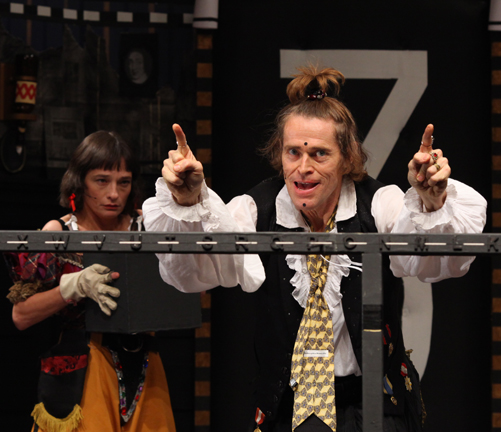 Elina Lowensohn and Willem Dafoe in Idiot Savant |
EDGE: Let's talk about what you started out trying to accomplish and how it's changed. And, of course, you conveniently forget that in the mid-60s I was in rehearsals with you, for weeks, playing a "kinetic lamp post". This was for your first play, but you don't even remember.
FOREMAN: No, I don't. I have no record.
EDGE: And there goes my place in theatrical history.
FOREMAN: Theatrical history. What I was trying to do, at the beginning, was to present — to make present onstage the performers, the objectives as sort of found objectives. I would use non-actors, such as yourself. And I would want them mostly to just confront the audience, to perform certain actions.
And the idea of confronting the audience was as if to say, okay, audience, here you have somebody saying a word, maybe getting undressed, presenting a body, and the performers would be staring at the audience, so that the whole play seemed to be saying, here's an aesthetic moment, audience, what do you do with it? What do you make of it? Rather than pulling you into narrative concerns, empathetic concerns. And, as time went on, that was still sort of the basis of my technique, and people still look at the audience a lot, but I surround it with a lot more, oh, theatrical razzle-dazzle. Staging where a lot of people are swirling around the stage, lights are changing, scenery is changing, new funny props are coming onstage. So it becomes more like if people will remember Hellzapoppin'; Olsen & Johnson, back in the thirties would do these sort of Dadaistic, vaudevillian things like that.
To return to my sources is to try to find a way to purge my material of a lot of that razzle-dazzle, but still confront the audience, saying what's going on here. Staring at the audience in film is a little different than staring at the audience in the theatre. Staring at the audience in film, I have been thinking a lot about the tradition of icon painting, where, in having people looking out from the frame of the icon, it's almost as if the subject matter then becomes you, and when you're seeing Christ or whoever it is stare at you, you are somehow internalizing that stare, and it's as if, no, you're not looking into the canvas or into the icon, to disappear into it romantically and to dream; no, it is being brought out to you. And it is again, as I was doing in the early days, questioning you or trying to evoke in you some other level of yourself that is more interested in just attentiveness, observation, noticing what the ground of the experience is. And that's what I've always been interested in. What's really going on here? What's the ground of the experience? Don't disappear into a dream.
 EDGE: The Ontological-Hysterical Theatre. Where does that name come from?
EDGE: The Ontological-Hysterical Theatre. Where does that name come from?
FOREMAN: Oh, that's not too interesting. In the early days, when I was just starting my theatre, I was working for Jonas Mekas, who you used to work for. And I was programming events in his theatre that were not filmic events, since he was the founder of the underground film movement in New York. I was programming theatrical events, which meant Jonas came up with the people, then I would just deal with them.
EDGE: Which theatre was this?
FOREMAN: Well, in the early days, it was on 80 Wooster Street, his first cinematheque, his first permanent theatre, though he had been in a lot of different theatres, moving around. But, at this point, he invited a man, who's still active, by the name of Hermann Nitsch, an Austrian, who did sort of black masses in which, with a lot of loud noise, he would cut up a lot of dead carcasses, a lot of dead bodies, pour buckets of blood — real blood — over them. Pour blood over people. And he had a great poster. And it was some naked person with a big penis, and it said, "Hermann Nitsch, Orgies, Mysteries, Theatre." And I thought, wow, I'm starting a theatre; I need a name. A great name. Orgies, mysteries. Orgies, mysteries. And for some reason, Ontologic-Hysteric popped into my head. Now, it was appropriate because, especially in those days, I was basically taking classical theatre syndromes from the 19th century, like a menage a trois which I think, in psychoanalytical terms, was part of a hysteric syndrome. I was trying to redeem it with this sense of presence, with this ontological sense of what underlies all this trivial stuff of daily life. I was making ontological-hysteric theatre.
EDGE: When did you come up with the concept of the audience? Because, in those days, at the expanded cinema festival in 1965, which probably followed you.
FOREMAN: Well, it preceded me, then. I didn't start making my plays 'til '68.
EDGE: But as you recall, more often than we were pulling the rug out from the idea of audience. For example, take Lamonte Young's Theatre of Eternal Music and the realization that you're the instrument, that there was a nonlinear relationship between input and output. But, in your theatre, there's always been seats and you're always sitting there.
FOREMAN: That's because I come from the theatre. As a kid, I started making theatre. I went to the Yale Drama School, to be a playwright. I acted in college, in every play. So I come from the theatre. Now, Lamonte especially had a profound influence on me, when I first saw him. He made long, sustained tones over long periods of time. I remember thinking how could I put something like that into the theatre.
As to my relationship to the audience, I started out writing plays in imitation of Brecht, or Arthur Miller, or Gertrude Stein, or whoever it was. But when I started writing the kind of plays I'm writing, I specifically said — and believe me, it was true — I was not writing for an audience. I was writing for myself. I was making something for myself. And then just hoping that maybe somebody else had similar interests. But of course, in the early days, 75 percent of my audience would walk out after 20 minutes. And, of course, being a young Turk, I thought that was great, because it proved I was making real stuff. But I still have a very ambivalent attitude towards the audience, which is one of the things I've always hated about the theatre, because I believe that people, en masse, always have a reaction that is lower and less interesting than any individual person that you can confront and have a relationship with. So I shouldn't be in the theatre.
EDGE: Or you could do productions for one person.
FOREMAN: Yes. Yes. But that's difficult, because I want a lot of stuff. Scenery and stuff. So to finance it is a little difficult. But with film, my first idea when I started making film — and it was a good idea, but I'm not courageous enough to pull it off — I thought, okay, I'm going to put an ad in the paper, saying Richard Foreman is no longer making theatre, he's making film, and all of these films will be viewed for the first time on the day of his death. That's when they'll be available. And I do, spiritually and philosophically, like that idea, because I am sick of audiences.
EDGE: At the very beginning of Idiot Savant, there's a great moment when a voice issues instructions to the actors.
FOREMAN: "Instructions to the actors: Do not try to carry this play forward", do not — just let it happen; don't try to move it. And that was because, in rehearsals, though I like the actors that I'm dealing with, they had a tendency always to want to turn it too much into a real play that seemed to have a narrative, that seemed to have developing relationships between the characters. And I'd have to remind them, all the time, no, no, no, that's not what it's about. I thought, why the hell not just say it, at the beginning of the play, to remind them; which is also, to a certain extent, keying the audience into perhaps watching in a different way.
EDGE: It was interesting to see the actors lapse into acting.
FOREMAN: Yes. It happens. It happens. It's something you have to accept in the theatre.
EDGE: But in your previous plays, have you used real actors?
FOREMAN: Oh, yes, for many years, I have. But, oftentimes, they would be actors that I would force them — I would drain them of a lot of the more normal responses. I have no interest in navigating the stresses and strains of daily life, and the psychology of that relationship. In this play, I thought, what the hell, I've done so many plays; here I'm working with a star, a person very easy to work with, and I like him as a person. I am not going to sit on him and make him be a mannequin, like some of the actors are in some of my other plays. I knew what I was getting into. And I know both the pros and the cons of that. But it's my last play, perhaps. I thought, why the hell not let it happen and see what happens.
EDGE: Several years ago Edge publish your ideas about "The Pancake People". (See "The Pancake People Or, The Gods Are Pounding My Head", 3.8.05). Can we revisit?

FOREMAN: I remember thinking that with the computers, which I use a lot, you don't have to maintain, inside of your head, material, in the same way that you used to. If you were Goethe, you made of yourself a kind of cathedral of all this knowledge that was stacked and built and organized within you. And it gave a certain verticality to your being.
My thought, at the time I talked about Pancake People was, with the Internet, no, we don't have to know much, any more, because it's all available to us, spread out like a flat pancake, and we can access over here, over here, over here, whatever we want, and that spreads us thin. So, in a way, we have much more available to us, in a way we know more in a surface way, but we no longer have this cathedral-like structure.
It's very interesting, because, just two days ago, I got interested again, after many years, in Norbert Weiner. And I just started reading the latest biography of him, which talked about how he was very worried that with feedback mechanisms that he invented himself, along with Bateson, that it was going to destroy people's intelligence, because they were no longer going to have to rely on their own internalized knowledge, that it was going to just make them forget how to deal with all of that. So I've got to read further. But, yes, I think that's true.
EDGE: You mention Bateson. He once said to me that that the idea of cybernetics (as opposed to the scientific discipline of cybernetics, which petered out) — is the most important idea since Jesus Christ, as far as the havoc that it presents to language, to sense of self, other — and to the idea of being who you are.
FOREMAN: That may be true. And I think I've always felt that was true, except, there's always something else happening. It's still vaguely possible that these pancake people, these people in whom a certain level and function of the mind, a certain structure of the mind, is being destroyed, maybe out of that something we can't imagine will arise, who's to say? I don't know. But on the surface of things, based on my life experience, sure, I would agree. Sure.
EDGE: And where do you see it going?
For the past three or four years, I've been dealing with film, dealing with another thinker who is probably disreputable but somebody I have been reading again and again for the last five years, my attitude towards a lot of this has changed. And I don't think about where it's going, because I think that where it's going is just more illusionary structures. And I think that, for me, it's the ground of all of this that counts, and that doesn't change. And I'm trying to access that, and that will never change.
The thinker I am reading is Peter Kingsley, a scholar of the Greeks who specialized in the pre-Socratics. In 1997, he wrote a book entitled Ancient Philosophy, Mystery, and Magic: Empedocles and Pythagorean Tradition, about the pre-Socratics for OUP, which was very much accepted as a new but scholarly and acceptable book, by all the experts about the pre-Socratics. After that, he sort of went off the deep end, and started writing two books, the first was In the Dark Places of Wisdom. His most recent is a big, 900-page book called Reality, in which he talks primarily about Parmenides and Empedocles.
His thesis is that they who are looked upon as the founders of Western logic were not that at all, that they were really magicians who were teaching a spiritual message that has been misinterpreted, and misinterpreted many times over the years, and they were really teaching that this life that we are living is just nothing but deception and continual reinvention of false facades, and that really they were trying to provide access to something else, which has been denied by all the great thinkers, even, over the last 800 years. I find it a very powerful book. It's had a lot of influence on me.
It's a simple book to read — it's not like reading Heidegger. But it is totally elusive. I find that very interesting. You keep forgetting where you've just been taken by him, and you have to go back. I've read a little section of it, every morning, for the last five years.
I just assume that many people may think he's some kind of wacky, new-age thinker, which I don't think is the case. That's because I have no interest in wacky, new-age thinkers.
EDGE: What's going to happen to the culture that produces people like Richard Foreman, erudite people that have libraries; cathedral people? And what of the future of reading? Because I don't know if people are reading as much as before.
FOREMAN: No, they're clearly not. My first simple answer is, I couldn't care less. I still read every day. I still read a great deal.
My more officially responsible answer is what I said before. It's impossible to say if some other modality is going to arise that will replace that kind of rigor with some other kind of exploratory rigor. I have no idea. I tend to think, oh, all the things I'm interested in life are vanishing. Cities are changing, even the architecture of cities. I do like some advanced modern architecture, but everything — obviously, in our culture, there is a general lowering of the level, mostly controlled by market considerations. And to me that's horrible. But I know that when I was a young man, starting out, all the artists who were reaching my age were saying the same thing about people in my generation. So what the hell.
Of course, this kind of talk may all be conditioned by the fact that death is approaching. And when death is approaching, you do think about things differently. I'll die soon, and I'm well aware of that. And this play that you just saw, I'm amazed that a lot of people don't seem to see that it's about Willem Defoe playing a figure standing in for me, dealing with his own approaching death. And nobody talks about that.
EDGE: I had no idea.
FOREMAN: No? Really? Okay. Well, there you are. But did you have any idea that he was dealing with the specter of death or the specter of getting old?
EDGE: No.
FOREMAN: No? Okay. Okay. Well, then, you know what?
EDGE: Watching your plays, I don't try to think too much.
FOREMAN: Yes, you shouldn't. But what I can say in my defense is then I will claim that it's there and, in an insidious fashion, it's like a worm burrowing into you, and you're not aware of it consciously. That serves me okay.
EDGE: What if you live another 20 years? How are you thinking differently?
FOREMAN: We will find out how I will deal with that. I don't really expect to, but I hope I do. The way I've been thinking about making art now is that I'm not really interested in giving you an experience, What I'm interested in is a certain mental activity, a certain spiritual activity that I'm engaged in. My art is as if I were Spinoza, and instead of polishing lenses, I was polishing these big mirrors. These mirrors are my art, and they are trying to reflect and concentrate the untouchable, undefinable thrust that I'm trying to use with my head and heart, pursuing something. That is not the subject of my plays, but the energy of that activity I'm trying to reflect with these mirrors that are either play or film. That's the most I can say about it.
The final statement should be that in the realm of art the most important characteristic is courage. Courage to pursue what some voice inside of you, against the tidal wave of everything that's happening in the society, says go this way. Courage to pursue what you know you really have to pursue. That's what counts.




